[pagebreak:GreeningtheSupplyChain]
Unlike the environmental movement a generation ago, sustainability today carries a strong connotation of win-win benefits, efficiency, high performance, long-term thinking, and competitive advantage. Leading corporations across all industry sectors are increasingly making sustainability an integral element of their strategy, from product development, to manufacturing and the supply chain, and to marketing and communications despite the current recession. For many companies, sustainability is expanding to supply chain sustainability.
For our new report Greening the Supply Chain: Benchmarking Sustainability Practices and Trends, GTM Research conducted a survey of 74 supply chain executives to build a quantitative picture of current sustainable supply chain practices and plans. We found that despite its growing prominence, sustainability is not yet a core part of most companies' current investments. And it is not a prime driver of their supply chain agendas. Sustainability lies in the middle of the pack of supply chain priorities today, behind cost cutting, but will increase in importance over the next two years.
In this slideshow we present a summary of our findings.
[pagebreak:Greening the Supply Chain]
Looking at their supply chain agendas for the coming year, customer service gains are far more important than sustainability gains to our survey respondents. Just 36 percent of companies overall cited the improvement of environmental or sustainability supply chain activities as a major infl uence on their supply chain agenda, compared to 65 percent who cited customer service improvements. Larger companies and retailers tended to ascribe greater importance to supply chain sustainability, while small companies and CPG respondents tended to ascribe somewhat less importance to it.
Most Influential Business Processes on Supply Chain Agendas in the Next 12 Months (Industry and Revenue Detail)
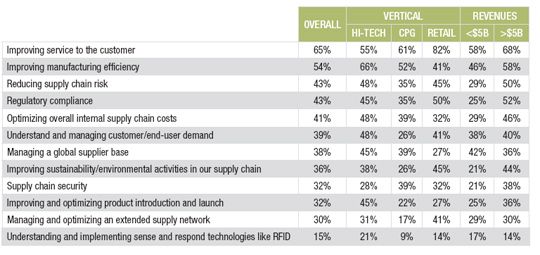
[pagebreak:Greening the Supply Chain]
Systems vendors and integrators have an opportunity to help companies with this integration challenge at time when many companies are at an early stage in integrating environmental and supply chain systems. Not a single respondent to our survey said that environmental information and supply chain systems were fully integrated at their company. A substantial majority of companies said either that they had only just started to integrate their systems or that their systems where numerous, heterogeneous, and disconnected. GTM Research expects that after companies experience a couple of years of largely manual or non-integrated procedures for collecting and acting on environmental information, they will begin to prioritize the deployment of environmental systems and their integration with other operational systems.
How Companies View the Integration of Their IT Systems That Manage Your Environmental Information With the Systems That Manage Their Supply Chain Activities (Industry and Revenue Detail)
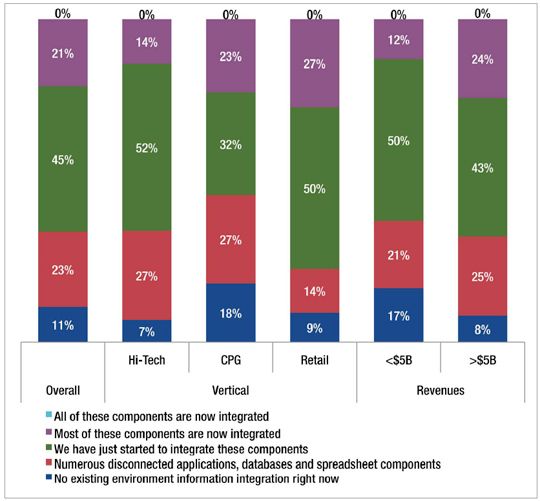
[pagebreak:Greening the Supply Chain]
Corporations have embraced energy efficiency as a prime supply chain sustainability initiative. They are tackling both the efficiency of their operations and of their products. Three quarters of companies we surveyed say they have made a corporate commitment to energy reduction, about as many have instituted a process to measure the energy used by their products. A majority already includes energy efficiency requirements in their product specifications – and nearly all will over the next 12 to 24 months. Most companies also say they try to save energy in transport by designing their products to be smaller and lighter.
Steps Taken to Enhance Energy Efficiency: (By Annual Revenues)
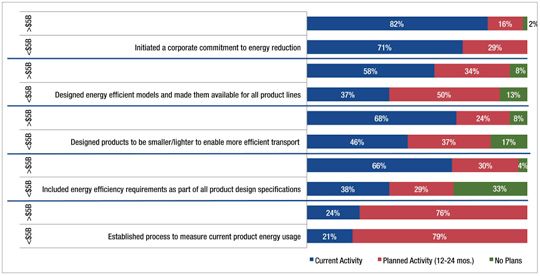
[pagebreak:Greening the Supply Chain]
Executives support it; systems are available to track, analyze and manage it; so what is standing in the way of greater sustainability in the supply chain?
The answer is a lack of a defensible financial rationale, according to the respondents to our survey.
A majority of respondents cited a lack of cost justification and conflicting priorities as the top barriers to implementing sustainable supply chain initiatives.
Barriers Organizations Face While Implementing Sustainable Supply Chain Initiatives (Overall)
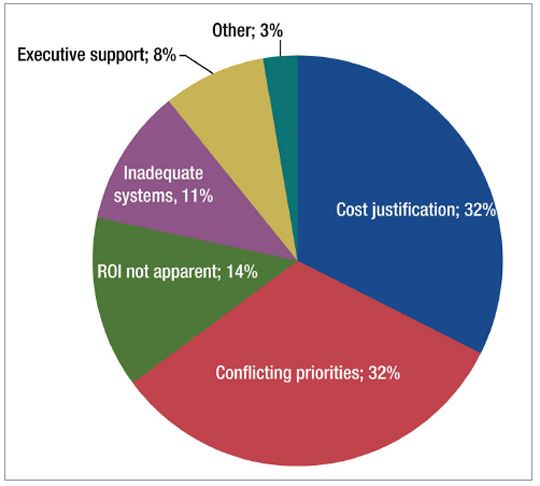
[pagebreak:Greening the Supply Chain]
Many executives are tracking customers' attitudes about the environmental footprint of the products they buy and the companies they do business with. Most executives agree that it will become increasingly important to meet customers' expectations for environmental performance. Some three-quarters of our respondents believe that their company's environmental stance will have a material impact on their business relationships with customers within the next three years, though just over one-third of respondents feel that the issue is material with customers today. As a consequence, most executives feel their company can stay ahead of the issue. Just 10 percent of executives fear they will lose sales because their products are insufficiently green. We believe executives are on track with their view that while environmental concerns are increasingly salient, they are not yet decisive for most customers.
When Companies Expect That Their Business Relationships With Customers/Prospects Will Be Materially Dependent Upon Their Environmental Stance (Industry and Revenue Detail)
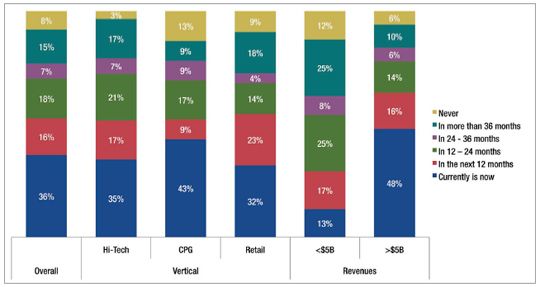
For more information on Greening the Supply Chain: Benchmarking Sustainability Practices and Trends, visit its report page.



